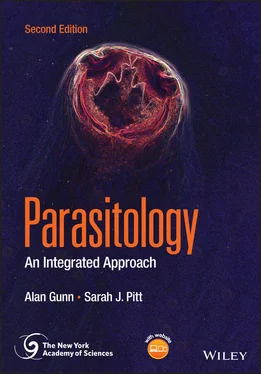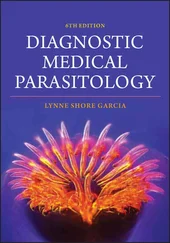Alan Gunn - Parasitology
Здесь есть возможность читать онлайн «Alan Gunn - Parasitology» — ознакомительный отрывок электронной книги совершенно бесплатно, а после прочтения отрывка купить полную версию. В некоторых случаях можно слушать аудио, скачать через торрент в формате fb2 и присутствует краткое содержание. Жанр: unrecognised, на английском языке. Описание произведения, (предисловие) а так же отзывы посетителей доступны на портале библиотеки ЛибКат.
- Название:Parasitology
- Автор:
- Жанр:
- Год:неизвестен
- ISBN:нет данных
- Рейтинг книги:3 / 5. Голосов: 1
-
Избранное:Добавить в избранное
- Отзывы:
-
Ваша оценка:
- 60
- 1
- 2
- 3
- 4
- 5
Parasitology: краткое содержание, описание и аннотация
Предлагаем к чтению аннотацию, описание, краткое содержание или предисловие (зависит от того, что написал сам автор книги «Parasitology»). Если вы не нашли необходимую информацию о книге — напишите в комментариях, мы постараемся отыскать её.
Highly detailed textbook on parasites and parasite relationships Parasitology: An Integrated Approach
Parasitology: An Integrated Approach, 2nd edition
Parasitology — читать онлайн ознакомительный отрывок
Ниже представлен текст книги, разбитый по страницам. Система сохранения места последней прочитанной страницы, позволяет с удобством читать онлайн бесплатно книгу «Parasitology», без необходимости каждый раз заново искать на чём Вы остановились. Поставьте закладку, и сможете в любой момент перейти на страницу, на которой закончили чтение.
Интервал:
Закладка:
473 467
474 468
475 469
476 470
477 471
478 472
479 473
480 474
481 475
482 476
483 477
484 478
485 479
486 480
487 481
488 482
489 483
490 484
491 485
492 486
493 487
494 488
495 489
496 490
497 491
498 492
499 493
500 494
501 495
502 496
503 497
504 498
505 499
506 500
507 501
508 502
509 503
510 504
511 505
512 506
513 507
514 508
515 509
516 510
517 511
518 512
519 513
520 514
521 515
522 516
523 517
524 518
525 519
526 520
527 521
528 522
529 523
530 524
531 525
532 526
533 527
534 528
535 529
536 530
537 531
538 532
539 533
540 534
541 535
542 536
543 537
Parasitology
An Integrated Approach
Second Edition
Alan Gunn
School of Biological and Environmental Sciences
Liverpool John Moores University
Liverpool
UK
Sarah J. Pitt
School of Applied Sciences
University of Brighton
Brighton
UK

This edition first published 2022 © 2022 John Wiley & Sons Ltd
Edition History John Wiley & Sons Ltd (1e, 2012)
All rights reserved. No part of this publication may be reproduced, stored in a retrieval system, or transmitted, in any form or by any means, electronic, mechanical, photocopying, recording or otherwise, except as permitted by law. Advice on how to obtain permission to reuse material from this title is available at http://www.wiley.com/go/permissions.
The right of Alan Gunn and Sarah J. Pitt to be identified as the authors of this work has been asserted in accordance with law.
Registered Offices John Wiley & Sons, Inc., 111 River Street, Hoboken, NJ 07030, USA John Wiley & Sons Ltd, The Atrium, Southern Gate, Chichester, West Sussex, PO19 8SQ, UK
Editorial Office 9600 Garsington Road, Oxford, OX4 2DQ, UK
For details of our global editorial offices, customer services, and more information about Wiley products visit us at www.wiley.com.
Wiley also publishes its books in a variety of electronic formats and by print‐on‐demand. Some content that appears in standard print versions of this book may not be available in other formats.
Limit of Liability/Disclaimer of Warranty While the publisher and authors have used their best efforts in preparing this work, they make no representations or warranties with respect to the accuracy or completeness of the contents of this work and specifically disclaim all warranties, including without limitation any implied warranties of merchantability or fitness for a particular purpose. No warranty may be created or extended by sales representatives, written sales materials or promotional statements for this work. The fact that an organization, website, or product is referred to in this work as a citation and/or potential source of further information does not mean that the publisher and authors endorse the information or services the organization, website, or product may provide or recommendations it may make. This work is sold with the understanding that the publisher is not engaged in rendering professional services. The advice and strategies contained herein may not be suitable for your situation. You should consult with a specialist where appropriate. Further, readers should be aware that websites listed in this work may have changed or disappeared between when this work was written and when it is read. Neither the publisher nor authors shall be liable for any loss of profit or any other commercial damages, including but not limited to special, incidental, consequential, or other damages.
Library of Congress Cataloging‐in‐Publication Data applied for Paperback ISBN: 9781119641193
Cover Design: Wiley
Cover Image: Courtesy of Alan Gunn
None of us truly live alone
Preface
This book is designed mainly for undergraduate students of biological sciences, biomedical sciences, medicine, and veterinary sciences who need to know about protozoan and helminth parasites and understand how they affect their hosts. It would also be useful for postgraduate students who need background information about parasites to support their research and for members of any other professional group who need an insight into the subject for their work.
Protozoan and helminth parasites are fascinating organisms, and examples of their parasitism are found in a broad range of hosts, including plants, invertebrates, and vertebrates. The interaction between a parasite and its host is complex and dynamic. Therefore, studying parasitology is useful for appreciating a range of concepts in biological sciences including growth and reproduction, biochemistry, immunology, and pathology.
Parasites do not live within their hosts in isolation. We feel that it is instructive to recognise how an individual organism might interact with other members of the same species, other species of protozoa and helminths, and other classes of microorganism within a particular host. The effects on the host of harbouring a particular species of parasite are influenced by various host factors, including genetic constitution, immune status, and behaviour. Also, for parasites of humans, consideration of social, religious, and cultural factors is often necessary. We therefore call this book ‘ Integrated Parasitology ’ to emphasise how parasites influence, and are influenced by, a complex web of interacting factors. All the material from the first edition has been extensively revised and updated. In addition, many new illustrations are included, and the on‐line support material has been expanded.
We divide the book into a series of conventional chapters, but because we wish to show how topics are inter‐related, the reader will find certain subjects are picked up, put down, discussed in more detail elsewhere, and then returned to in a later chapter. This is also a good way of learning since it is better to take in bite sized chunks of information and return to them frequently rather than attempt to grasp all aspects of a topic in a single sitting. We first introduce the concept of parasitism and the terms used by parasitologists to describe parasite lifestyles. There then follows a brief consideration of taxonomy after which, in Chapters 3– 7, we introduce some of the ‘key players’ explain their basic biology and how they interact with one another. Within this second edition, we have included more diagrams of parasite life cycles, but the reader is also recommended to consult the excellent online resource available at the DPDx – CDC Parasitology Diagnostic Web Site ( http://dpd.cdc.gov/dpdx). There follows a chapter on parasite transmission in which we consider, amongst other topics, not only how parasites exploit other animals as vectors and intermediate hosts but also how they manipulate their host’s behaviour to increase the chances of transmission. We provide separate chapters on immunology and pathology, but in truth, it is virtually impossible to separate these topics because they are so inter‐dependent. Chapter 12provides a counterbalance to the bad press that parasites receive. Parasites can not only be used for the treatment of medical conditions but also (in small doses) actually be good for us. Before one can begin to study parasites, one needs to be able to find them and count them. Even if the host is dead, this is not necessarily as simple as it sounds. Correct parasite identification is essential before treatment can be given and to determine whether a control programme is performing effectively. We therefore devote Chapter 13to parasite diagnosis that encompasses techniques ranging from straightforward light microscopy to advanced molecular biology. We then consider methods of treating and vaccinating against parasites in separate chapters before ending with a chapter on control strategies.
Читать дальшеИнтервал:
Закладка:
Похожие книги на «Parasitology»
Представляем Вашему вниманию похожие книги на «Parasitology» списком для выбора. Мы отобрали схожую по названию и смыслу литературу в надежде предоставить читателям больше вариантов отыскать новые, интересные, ещё непрочитанные произведения.
Обсуждение, отзывы о книге «Parasitology» и просто собственные мнения читателей. Оставьте ваши комментарии, напишите, что Вы думаете о произведении, его смысле или главных героях. Укажите что конкретно понравилось, а что нет, и почему Вы так считаете.












